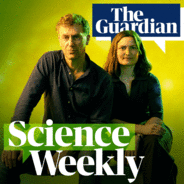Science editor Ian Sample joins co-host Madeleine Finlay to discuss some of the most intriguing science stories of the week. From a concerning rise in hospital diagnoses of constipation in children, to research suggesting that the environment is far more important for ageing and longevity than our genes, and how squeaks from genetically engineered mice are providing insight into how human language may have emerged. Help support our independent journalism at theguardian.com/sciencepod

Wissenschaft & Technik
Science Weekly Folgen
Twice a week, the Guardian brings you the latest science and environment news
Folgen von Science Weekly
300 Folgen
-
Folge vom 20.02.2025Singing mice, constipated kids and nurture beats nature: science stories of the week
-
Folge vom 18.02.2025Should we ban cats?The Scottish first minister, John Swinney, was recently forced to deny plans to ban cats after a report from independent experts said the species was a threat to Scotland’s wildlife. In the UK, it is estimated that cats kill or bring home 57 million mammals and 27 million birds every year. Ian Sample hears from cat-owner Madeleine Finlay and the ecologist Prof Robbie McDonald about the best ways to reduce our feline companions’ impact on wildlife without affecting welfare. Help support our independent journalism at theguardian.com/sciencepod
-
Folge vom 13.02.2025What is ‘mirror life’ and why are scientists sounding the alarm?Recently, a group of world-leading scientists called for a halt on research to create ‘mirror life’ microbes amid concerns that the synthetic organisms would present an ‘unprecedented risk’ to life on Earth. Ian Sample tells Madeleine Finlay about why this work initially seemed exciting for scientists and what the risks of it continuing could be. And Kate Adamala, assistant professor of genetics, cell biology and development at the University of Minnesota, describes what made her change her mind about pursuing her own research on mirror cells. Help support our independent journalism at theguardian.com/sciencepod
-
Folge vom 11.02.2025Don’t look up: is an asteroid heading for Earth?In a case of life imitating art, a 100-metre-wide asteroid has triggered global planetary defence procedures for the first time, after telescope observations revealed it had a chance of colliding with Earth in 2032. To find out what happens now and how worried we should be, Ian Sample hears from Richard Binzel, a professor of planetary sciences at MIT and inventor of the Torino scale, which is used to categorise the threat posed by objects such as asteroids and comets. Help support our independent journalism at theguardian.com/sciencepod
